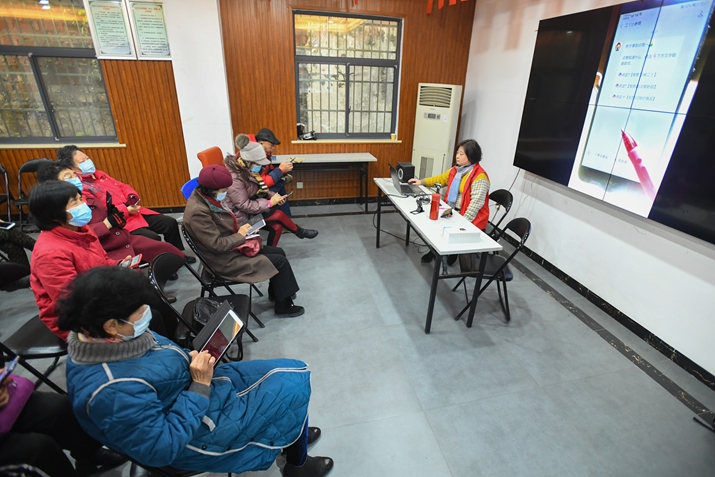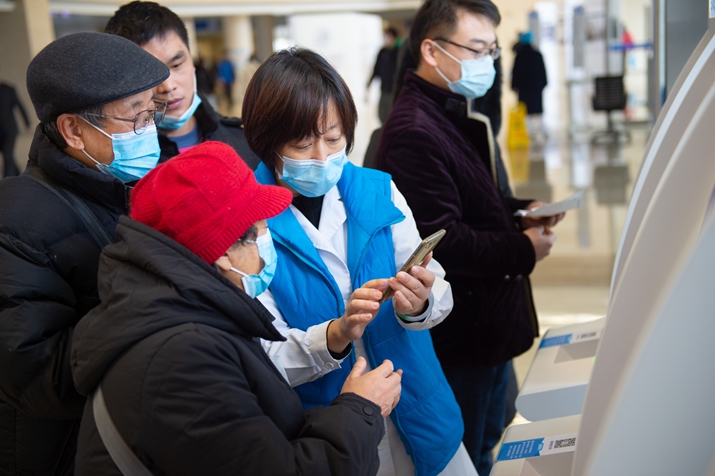| China |
| A series of measures are being implemented to help senior citizens adapt to China's digital transformation | |
|
|
 A volunteer shows the elderly people how to use a smartphone in a community in Changsha, Hunan Province in central China, on January 12 (XINHUA)
Li Guangping, a 65-year-old woman from Beijing, recently discovered a version of the popular ride-hailing app DiDi Express specially designed for seniors. This version features larger Chinese characters, a simplified user interface, and an option to "order a DiDi taxi with one click." "My family helped me enter the destination address that I use frequently, and now all I have to do is to press a button to call a DiDi car. It's very convenient," she said. With the rapid development of information technologies, smart services have made significant inroads in various fields, including transport and medical services. However, this evolution has not always made life easier for many senior citizens and even created difficulties for many. He Yu, an associate researcher at the Jiangsu Institute of Social Policy, believes that these problems show "a very high technology level and a lack of humanization." "To enable the elderly people to better adapt to the digital transformation, the whole of society needs to take action," said Zhao Chenxin, Secretary General of the National Development and Reform Commission, at a press conference. Through policy guidance and joint efforts, the problems experienced by senior citizens could be solved more effectively.  An employee of Tiantan Hospital in Beijing helps some senior people pay with their smartphone on December 9, 2020 (XINHUA)
Taking action together According to the National Bureau of Statistics, the number of people aged 60 and above in China at the end of 2019 was 254 million, or 18.1 percent of the total population. On February 3, the China Internet Information Center released a report indicating that in December 2020, the number of Chinese Internet users reached 989 million, and the proportion of users aged 60 and above was only 11.2 percent. China will move toward a "moderately" aging society by the end of the 14th Five-Year Plan (2021-2025), with the population aged 60 and above totaling 300 million people, according to the Ministry of Civil Affairs. In this context, meeting the needs of senior citizens has become a major concern for the society. On November 24, 2020, the State Council issued a plan outlining 20 targeted initiatives on services related to older people's daily lives, covering areas including travel, medical care, consumption, and leisure. Its objective is to help them maintain their independence in the face of society's digital transformation. Li Rongjin, Deputy Director of the Jiangsu Provincial Development and Reform Commission, believes that senior citizens' specific needs have to be taken into consideration. If they don't know how to use a digital tool, training should be made available; if they have no choice but to use a digital service, the software should be improved to make it more user-friendly. People who are reluctant to use new technologies should also be offered a more traditional alternative. A dozen senior citizens are currently undergoing training on how to use smartphones in a community in Ningbo, Zhejiang Province in east China. "They are very committed to learning how to use smartphones. So we have launched courses to train them," said Zhou Ling, the community manager. The training courses include learning how to use online shopping and payment applications and how to prevent telecom fraud. Simplifying digital tools is equally important. Since January, the Chinese Ministry of Industry and Information Technology has launched an action plan to address the difficulties encountered by senior citizens, people with disabilities and other groups using the Internet and smart technologies. A list of applications was compiled, including social networks, shopping platforms and applications for financial services, transport, and healthcare. Recently, DiDi Express has launched a simplified, ad-free "senior mode" to meet the need of the elderly people. However, it is necessary to continue to provide offline services, such as medical consultation, social security, banking, telecommunications, bill payment, etc. "In everyday life, traditional services must be maintained to facilitate the transition to new technologies," says Zhao. Facilitating consumption In recent years, aging in China has accelerated, resulting in more and more products and services in the market targeted at senior citizens. The adaptation of older people to the digital transformation is a prerequisite for promoting the "grey economy." According to the report on China's aging population, from 2014 to 2050, the consumption level of senior citizens will increase from $621 billion to around $16,462 billion, representing 33 percent of the GDP, making it the country with the largest market potential in the world for the grey economy. In early December 2020, e-commerce giant JD.com and ZTE, a Chinese communications solution provider, jointly launched a 5G smartphone designed for senior citizens. The device features special applications such as online medical consultation, geolocation and taxi-hailing services. In addition, an increasing number of Chinese hi-tech companies are now catering to the needs of the senior generation and developing products specifically designed for the elderly, thereby accelerating their entry into the ever-expanding senior market. The popularity of smartphones has boosted the potential of the grey economy, especially when it comes to consumption. Wang Fengmei, 63, a resident of Yinchuan, capital city of Ningxia Hui Autonomous Region in northwest China, handles online shopping and mobile payments with ease. "My friends have also embraced these new technologies. We usually shop online and use as many applications as young people do," she said. According to a report by Alibaba group, the COVID-19 epidemic has accelerated the pace of the elderly people's acceptance of new technologies. Their consumption potential should not be underestimated. However, the report also indicates that 50 percent of older people decide to give up a transaction if they encounter difficulties when making an online purchase. Despite these difficulties, elderly people are usually eager to keep up with the times and are perfectly capable of improving their skills through learning. Maintaining their independence in the face of modern life, which is changing ever more rapidly, and enabling them to fully benefit from the convenience of the digital society requires close cooperation and joint efforts by all parts of society, including families, communities and businesses. (Print Edition Title: Connecting the Elderly) Comments to glj@chinafrica.cn |
|
||||||||||||||||||||||||||||||
|